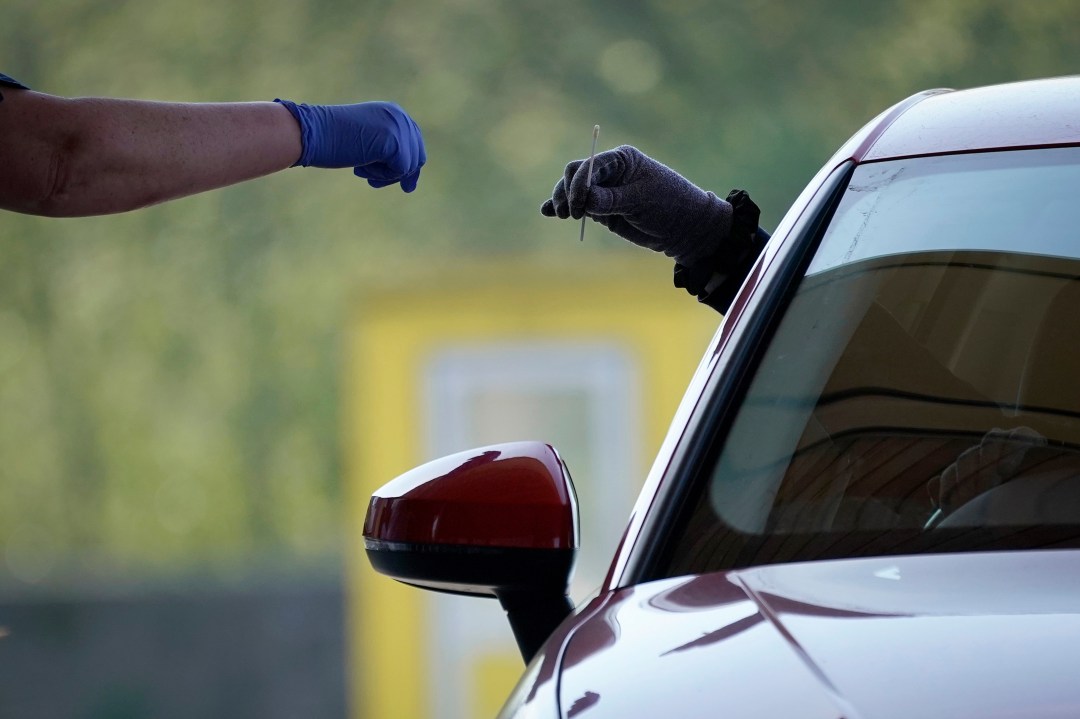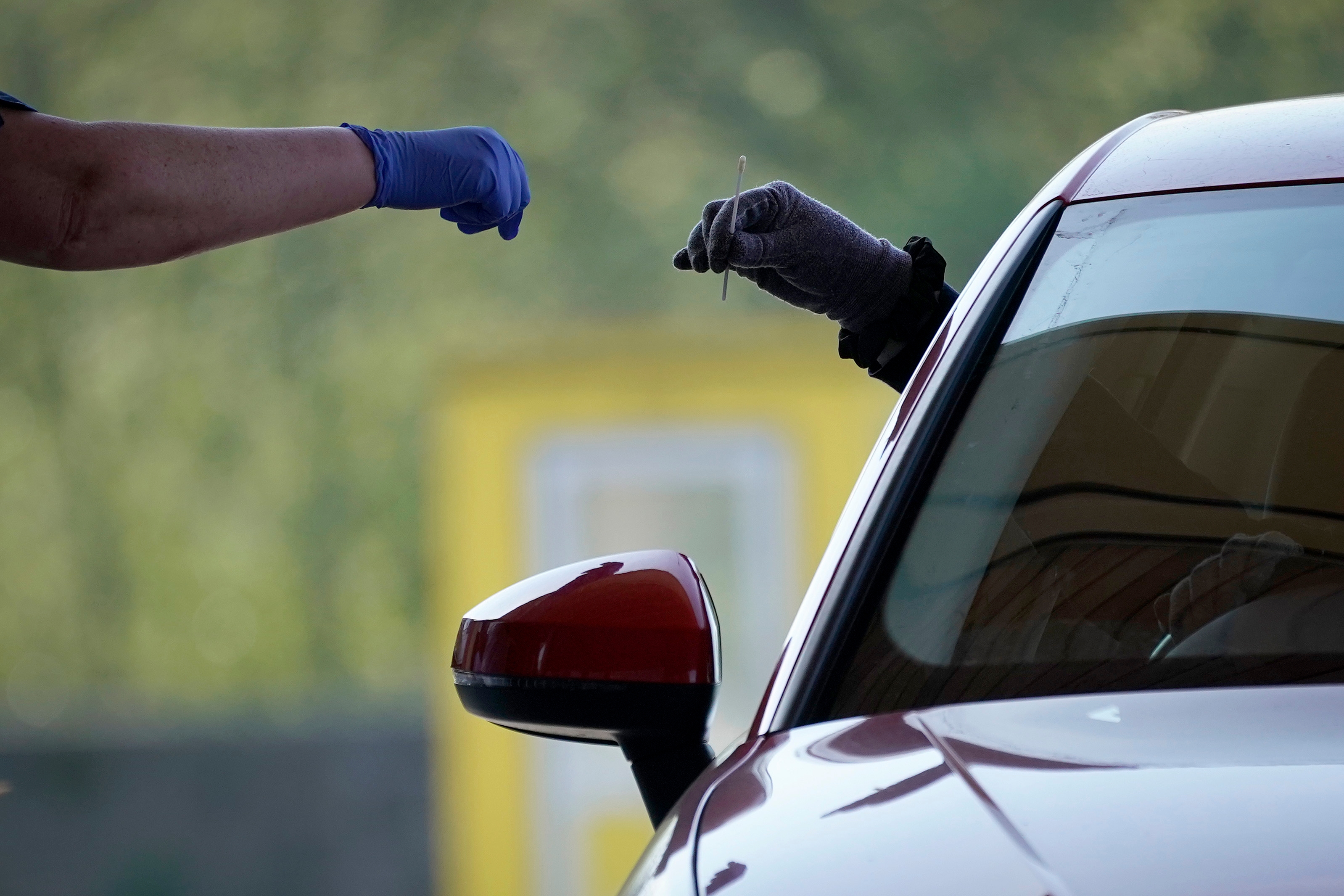Matt Hancock has announced a £100 billion spending programme for mass population testing — his so-called ‘moonshot’ initiative, that would see 10 million tests delivered a day. Does this mean we need rocket boosters under the testing programme, fuelled by vast reserves of taxpayer cash? Thankfully, there could be a simpler and more pragmatic approach that not only saves money but would prevent a lot of harm.
There are currently two main problems. The first is a poor definition of what constitutes a case of coronavirus. The second is a testing strategy designed for the wrong point in the pandemic.
The government advisory group SAGE estimates that the standard tests used now have a false-positive rate of less than one per cent. But that’s quite a big range. Oxford’s Carl Heneghan has written before about the implications of a false positive rate of even 0.1 per cent. If the real number was closer 1 per cent – which SAGE seems to consider quite feasible – it would mean that if 100 people are tested using our current methods, around one person would be diagnosed as Covid positive even if they don’t have the disease.
If the UK was completing 200,000 tests a day (which is around the number the government says it’s currently carrying out), you would expect between 2,000 false positives a day. That accounts for the majority of our current positive results.
There have been 17.7 million tests carried out so far. A false positive rate of 1 per cent would mean that 177,000 of those positive results would be false positives. That’s nearly half of all the cases ever diagnosed in the UK.
This dilution of the seriousness of the disease is only part of the issue. Firstly, it has led to life, and indeed, world-changing political decisions based on false data. Secondly, it has also led to Covid appearing increasingly benign. For example, during the spring 6 per cent of Covid hospital admissions died. Current Covid hospital admissions have a mortality rate that is the same as any random sample of hospital admissions. Some of this will be down to improved treatment programmes and greater knowledge among intensive care specialists. But it’s also likely that the number of false-positive cases going into hospital has returned the fatality number to the historical mean.
Instead of this one-size-fits-all testing regime, we should have a more reactive strategy
Thirdly, by labelling patients without classic symptoms as having Covid, we have all accepted the idea that the symptoms can vary hugely. Unpicking this mess to really understand which symptoms matter will be incredibly difficult.
Fourthly, test and trace has been spread thin and has been chasing non-cases. Over the summer there were more than 500 false-positive results a day. Their contacts were then reached and tested. Around 1 per cent of them will have tested (falsely) positive too. This can create the illusion of spread.
Finally, new and better tests may be dismissed as lacking in sensitivity because they fail to recognise all these false-positive cases. Without addressing the false-positive issue it will appear we have a constant stream of cases and will be unable to return to normal.
These problems are just some of the harmful effects caused by testing 200,000 patients a day with a 1 per cent false-positive rate. The moonshot proposal is to test 10 million patients a day. SAGE has warned that rolling out the moonshot programme could result in 28 million of us being unnecessarily detained in self-isolation in the first six months. Is there a better approach?
For all testing, there is a binary trade-off to be had. Do you want a test with high sensitivity that will pick up every last case at the risk of including a number of false positives? Or would you rather have a test with high specificity that prioritises being certain that each case is real even if it misses a few real cases?
During an epidemic with high prevalence, a testing strategy that maximises sensitivity is required; this is the approach we are currently using. The purpose of testing, in this scenario, is to ensure we capture every possible case to slow down further spread. While not perfect (in that it could lead to more positives than actual infections) it is reasonable. Only 1 per cent of the tests will be falsely mislabelled as Covid and these become insignificant amidst the challenge of stopping the spread of the disease in a high prevalence scenario.
For low prevalence disease situations, like now, this approach most definitely does not work. Now we need to be able to identify a new outbreak and to avoid mislabelling a healthy population. Missing a percentage of cases is acceptable in this scenario as, if there are only negligible numbers, spread is less of a risk. Instead testing must be able to provide near certainty that the patient has been correctly diagnosed. So a test with the opposite characteristics is needed: low sensitivity and high specificity. No single test can do that. Current testing by PCR (polymerase chain reaction swab testing of the back and throat, used to detect viral RNA) comes close with only 1 per cent positives — but we can do better.
We know that loss of smell is one very specific indicator of Covid in a large proportion of genuine cases. Earlier in the epidemic, it was shown that this one sign could pick up 65 per cent of cases. Of the people who had lost their smell during the epidemic, 97 per cent would have had Covid. Asking if someone has lost their sense of smell is therefore an excellent test for Covid. Although a 65 per cent sensitivity may not sound enough it means it can identify 65 per cent of individual cases; it can identify 88 per cent of occasions when it has spread to one other person and 96 per cent of outbreaks involving three individuals.
Using loss of smell combined with current testing would result in a specificity of 99.9997 per cent or a one in 3,000 chance of error rather than one in 100. It is still not zero, but if testing is restricted to people with loss of smell then it would work almost perfectly.
As well as loss of smell there are characteristic changes seen on chest CT scans that have also been shown to have high specificity, i.e. testing that is very good at picking up cases but might miss a few. Using these lung changes or new-onset loss of smell as a gateway to current testing would solve the problem we currently face with false-positives and an overwhelmed testing system.
When prevalence is very high, symptoms alone become a very good indicator of who has the disease and testing is not necessary at all for confirmation. Anyone with relevant symptoms should be assumed to have the disease. Later, antibody testing can offer confirmation.
So instead of this one-size-fits-all testing regime, we should have a more reactive strategy — one that uses the benefits of specificity and sensitivity in certain scenarios while mitigating their downsides in others. The proposal is to have three tiers of testing each appropriate to the level of disease in the regional population:
| PCR Testing (for viral RNA) restricted to | Trigger to escalate region* | Trigger to de-escalate region | Definition of Covid | |
| Base | Anosmia (loss of smell in absence of nasal congestion) OR Characteristic changes on chest CT | Single positive case from PCR | N/A | Fulfilled testing criteria and PCR positive |
| Ascent or Descent | Anosmia Characteristic changes on chest CT Contacts of cases Screening of hospital admissions who are more than 70 years old or symptomatic | PCR positive rate breaches 10 per cent** of those tested OR Test and Trace overwhelmed | PCR positive falls below 1.5 per cent for two weeks | Fulfills baseline testing criteria and PCR positive Contact of diagnosed case and PCR positive Asymptomatic and positive gene sequencing / PCR plus changes on CT |
| Peak | Screening of all hospital admissions and nursing home patients Random screening of symptomatic population to determine extent of outbreak | N/A | PCR positive rate falls below 10 per cent** | All symptomatic patients diagnosed without testing |
*The ‘region’ could vary in size depending on the situation.
**The cut off has huge implications for freedom and costs so would need to be a political decision.
The appropriate testing regime would be dependent on the region you are in. Each region would progress up and back down the scale at its own pace. What is critical is that at the baseline, when there is no evidence of a specific test indicating an outbreak, then people with common cold symptoms can live normally. No one need be considered a pariah for coughing in public and pupils can stay in school.
What about the patients who don’t meet diagnostic criteria during the ascent and descent phases? Patients who have classic symptoms but are test negative and those over 70-years-old that are test positive despite being asymptomatic need a label. I propose we call these cases ‘Covoid’. This will enable research to determine whether these patients do indeed have Covid and will produce antibodies and whether they are contagious. Precautions to prevent spread should be taken with these patients until the former are clear.
The original moonshot was a step forward for research that created advances in defibrillators, pacemakers, dialysis, insulin pumps and digital imaging — and those were just the medical steps forward. Innovations like these do not appear thanks to government money but instead because of freedom. If he doesn’t reform the way we currently carry out tests, Hancock’s moonshot will only reduce our freedom and at huge cost to us all.







Comments